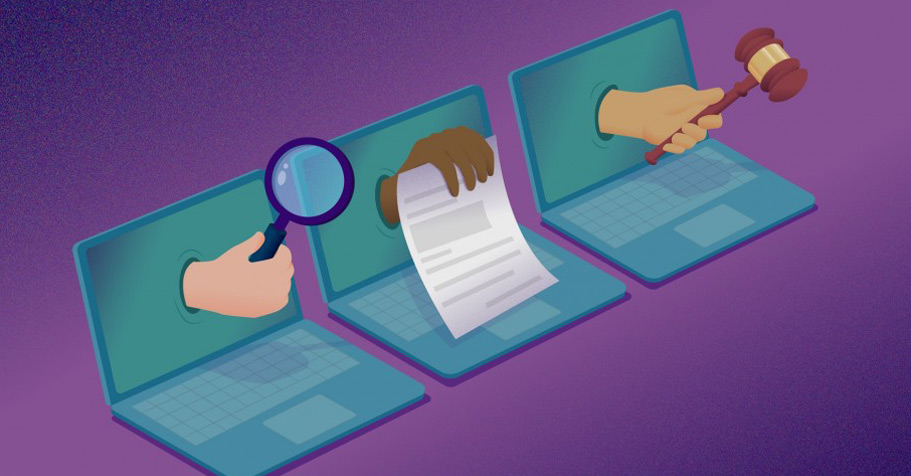- Home
- / Insights
- / FTI Journal
The Challenges (And Surprising Benefits) of Conducting Remote Investigations

-
June 30, 2020
DownloadsDownload Article
-
The first in a series of semi-monthly articles on conducting forensic investigations remotely discusses why they are effective, and why they may be the new normal.
It is well settled that times of crisis bring with them increased compliance risk. Crises such as the COVID-19 global pandemic create uncertainty and instability in the markets. These conditions in turn drive many organizations to modify their business models, restructure or downsize. These factors create opportunities or impose pressure on employees — real or imagined — that lead to fraud and misconduct.
That some organizations have, therefore, experienced an increase in the number of fraud and misconduct allegations during the COVID-19 pandemic is no surprise. In fact, many organizations are dealing with a backlog of allegations to investigate, a backlog that began in the early spring 2020 and continues to increase.
Notwithstanding the increase of fraud and misconduct allegations many organizations are grappling with, the COVID-19 guidelines and work-from-home mandates, on the other hand, present obstacles for compliance officers and business leaders to investigate these matters. The prospect of performing certain basic investigatory procedures — such as collecting and preserving data, performing fieldwork, conducting interviews and presenting findings — appears untenable. Many organizations are understandably unsure of the best course of action.
To add to the uncertainties, guidance and procedures in regard to leading practices for conducting investigations in the current climate continue to evolve, with regulatory agencies seemingly publishing directives on a real-time basis.
This uncertainty leaves many organizations asking:
- Is it okay to postpone investigations?
- How do we manage an investigation efficiently and effectively when the investigative team is not physically together?
- What additional factors need to be considered when planning and scoping a remote investigation?
- How do we collect structured data from outside a company’s network, paper documents from the office, and data from laptops and smartphones from employees who are not in the office?
- How do we verify the authenticity and completeness of documents collected?
- What are important planning and technology considerations when preparing to conduct interviews effectively via teleconferencing or video platforms?
- What factors need to be considered when preparing to virtually present results to enforcement agencies? How do we deal with scope limitations?
Investigations Need to Be Performed — and They Can Be
The good news is that fraud and misconduct investigations can be conducted remotely through means other than traditional face-to-face approaches. The reality is that, even prior to the pandemic, many organizations had begun conducting investigations remotely for myriad reasons. Whether due to organizations striving to minimize travel costs or otherwise, the notion of conducting investigations remotely is not a novel one. Many organizations have been doing it for some time, and with good success. And in some instances, remote techniques and technologies have proven to be even more effective than age-old traditional methods.
Organizations currently considering pivoting to remote investigations should note the following benefits:
- Time sensitivity: Allegations of fraud or misconduct are often time sensitive, and organizations should not wait until COVID-19 restrictions are relaxed or lifted to undertake important investigative work.
- Efficiency: Many aspects of investigations can be more efficient and expeditious when they are performed remotely and leverage various technology platforms.
- Consistency: When investigations are conducted remotely by the same core investigative team, the result is a more consistent approach in terms of the tone and tenor, approach, execution and output of the investigation.
- Cost-effectiveness: Investigations performed remotely are generally less expensive than investigations that require in-person meetings and travel.
- Defensibility: When organizations investigate allegations of fraud or misconduct quickly and thoroughly, they enhance their positions should a legal or regulatory matter arise related to the underlying matter.
When COVID-19 is ultimately behind us, one thing is certain: The methods used to investigate allegations of fraud and misconduct will have evolved. In the next article in our series, we will explore leading practices for conducting investigations remotely.
© Copyright 2020. The views expressed herein are those of the author(s) and not necessarily the views of FTI Consulting, Inc., its management, its subsidiaries, its affiliates, or its other professionals.
About The Journal
The FTI Journal publication offers deep and engaging insights to contextualize the issues that matter, and explores topics that will impact the risks your business faces and its reputation.
Published
June 30, 2020
 Key Contacts
Key Contacts
Senior Managing Director
Senior Managing Director
Managing Director